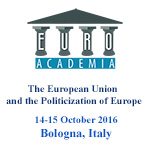Euroacademia Conferences
 Europe Inside-Out: Europe and Europeanness Exposed to Plural Observers (9th Edition) April 24 - 25, 2020
Europe Inside-Out: Europe and Europeanness Exposed to Plural Observers (9th Edition) April 24 - 25, 2020 Identities and Identifications: Politicized Uses of Collective Identities (9th Edition) June 12 - 13, 2020
Identities and Identifications: Politicized Uses of Collective Identities (9th Edition) June 12 - 13, 2020 8th Forum of Critical Studies: Asking Big Questions Again January 24 - 25, 2020
8th Forum of Critical Studies: Asking Big Questions Again January 24 - 25, 2020 Re-Inventing Eastern Europe (7th Edition) December 13 - 14, 2019
Re-Inventing Eastern Europe (7th Edition) December 13 - 14, 2019 The European Union and the Politicization of Europe (8th Edition) October 25 - 26, 2019
The European Union and the Politicization of Europe (8th Edition) October 25 - 26, 2019 Identities and Identifications: Politicized Uses of Collective Identities (8th Edition) June 28 - 29, 2019
Identities and Identifications: Politicized Uses of Collective Identities (8th Edition) June 28 - 29, 2019 The European Union and the Politicization of Europe (7th Edition) January 25 - 26, 2019
The European Union and the Politicization of Europe (7th Edition) January 25 - 26, 2019 7th Forum of Critical Studies: Asking Big Questions Again November 23 - 24, 2018
7th Forum of Critical Studies: Asking Big Questions Again November 23 - 24, 2018 Europe Inside-Out: Europe and Europeanness Exposed to Plural Observers (8th Edition) September 28 - 30, 2018
Europe Inside-Out: Europe and Europeanness Exposed to Plural Observers (8th Edition) September 28 - 30, 2018 Identities and Identifications: Politicized Uses of Collective Identities (7th Edition) June 14 - 15, 2018
Identities and Identifications: Politicized Uses of Collective Identities (7th Edition) June 14 - 15, 2018
The Borders of Europe
-
-

-
Presentation speakers
- Federico Cavalleri, University of Milano-Bicocca, Italy
- Download presentation
Abstract:
The aim of this paper is to show how Europeanisation should not be seen as a standing element, but rather as one of the main knots in which the global flows of culture, images and ideas crossing the European’s imagination are entangled. Europeanisation is to be considered as a discursive process through which the European identity (the so-called Europeanness) becomes part of a wider narration that includes other symbols, values, imagines etc. The paper is based on an ethnographic research carried out on the island of Cyprus after the economic and financial crisis of 2013. It analyses the rhetorical use of the adjective European by Greek-Cypriots when asked to define their ethnical and national identity as well as the way it changes depending on the different “Other” Cypriots want to distinguish from. The focus is on the strategic use of the term Europeanness which allows one same group of people, on different occasions, to recover the ones that have been pointed at as “others” or to keep them out. In particular, the paper pinpoints three main oppositions (Greek vs Turkish, Mediterranean vs European and Cypriot vs Greek), where the tool of Europeanness is used to underline the border dividing two identity categories. Eventually, it challenges the concept of Europeanisation as a process from a point of less Europeanness to one of more Europeanness. In fact, the meaning of being European cannot be understood by taking the Europeanness for granted, as a clear and sharp concept, but rather by investigating the relationship between Europe and other symbols as modernity, development, national or ethnic identity, etc., following all the different and contested meanings it can assume among people.
-
Related Presentations

Theorizing European Disintegration in Times of Complexity
- Senka Neuman Stanivukovic

The EU’s Changing Discourse in the EU Documents on Civil Society in Turkey
- Alper Yurttas
- Selma Sekercioglu













